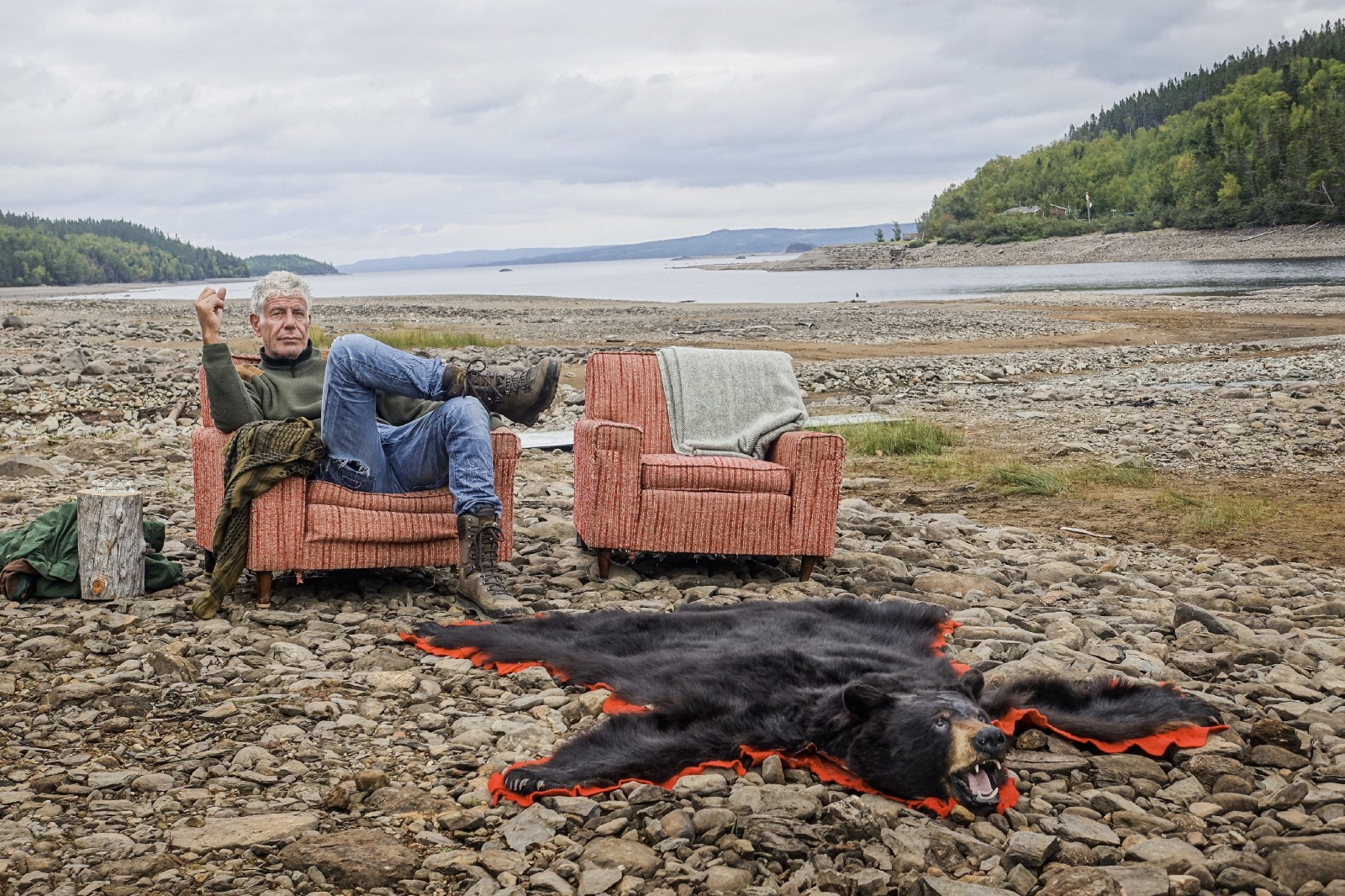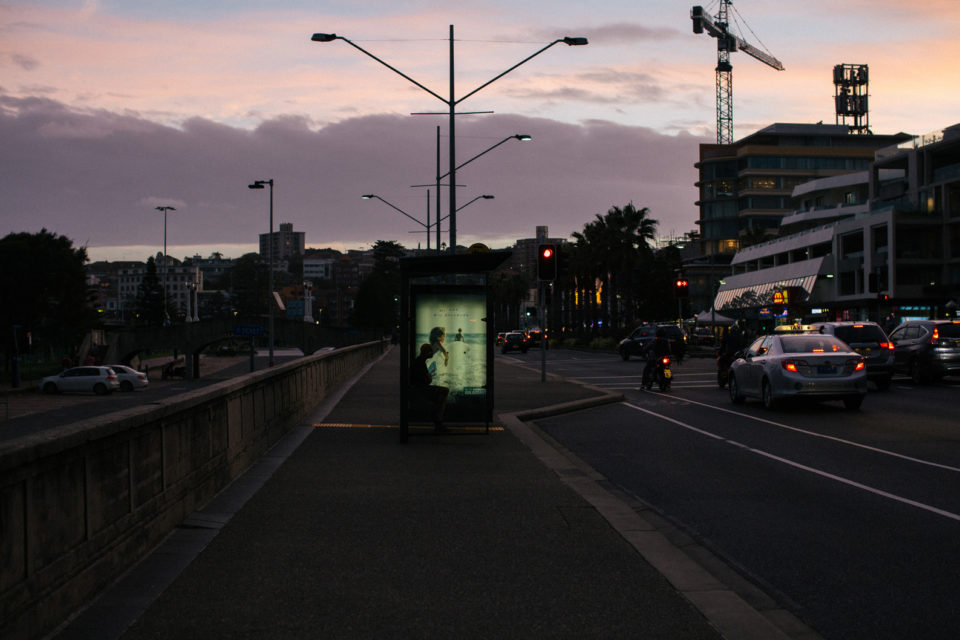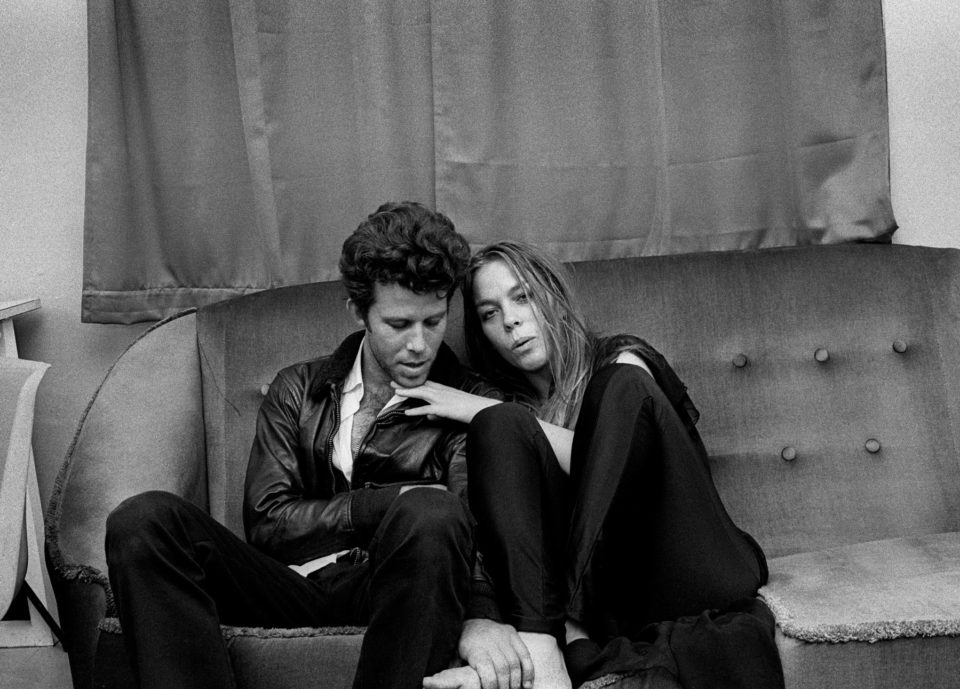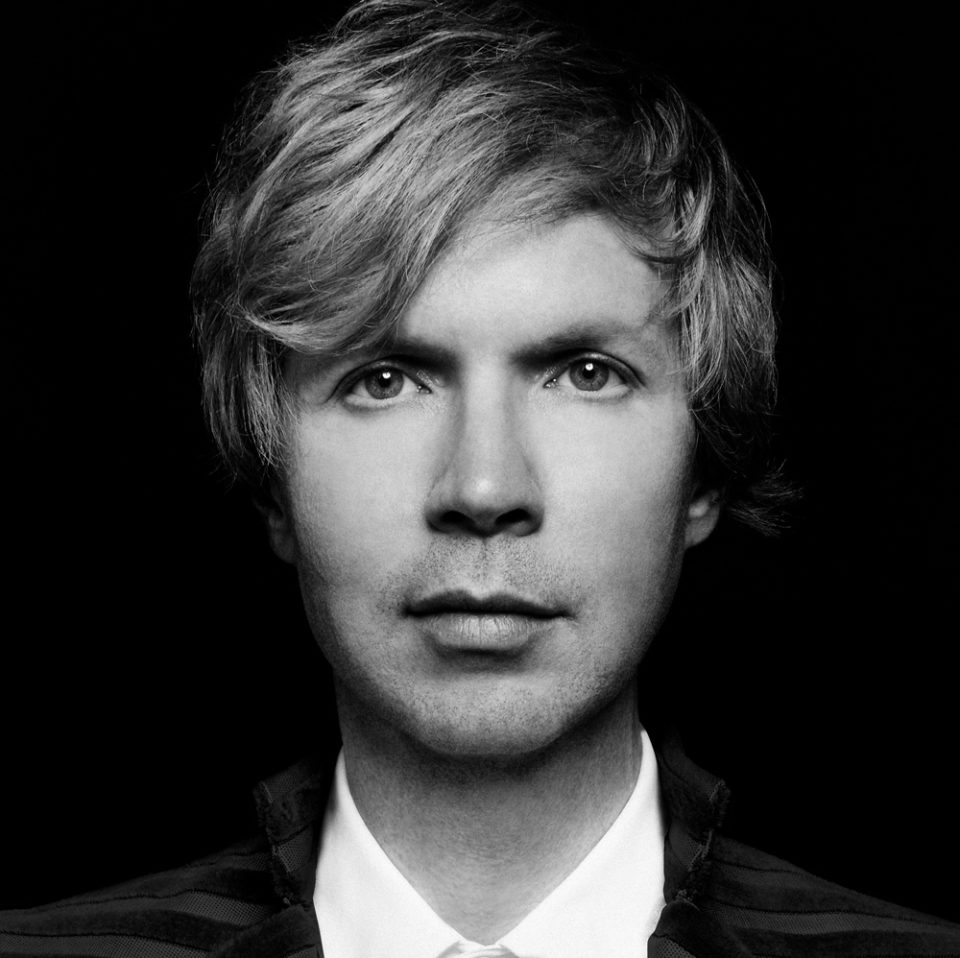I was in San Miguel when I heard about Anthony Bourdain. A friend had texted me, which allowed me a moment to imagine that his lifestyle had maybe caught up to him. All the years of unabashed hedonism; smoking, drinking, eating everything that crossed his plate. That would have been okay to me, on the scale of how someone has to go.
My father had died that way. He took a drink at the bar and fell down dead of a heart attack. This had been, for him, I liked to imagine, the ideal way to leave. For the bartender who had poured him the beer, not so much. I remember when he turned up at the funeral, looking somehow as if he were responsible when he wasn’t.
The heart, a lonely hunter.
When I found out what had really happened to Bourdain I was so angry. I cried floods of tears that hit me in jags for two days. There was never a person who seemed more like they would live forever than Anthony Bourdain. Greedily I had imagined him globetrotting into his 90s, still firing off crotchety but loving missives as an old man. Perhaps he would have been sitting on a stoop somewhere in Hoi An, slurping a bowl of hot noodles washed down with cold beer, marvelling at the sheer incalculable luck of still being alive in such a beautiful place.
When I’d gone to Vietnam to retrace my father’s steps in the war, Bourdain had been my guide. As someone who’d grown up with the idea of travel being as foreign to me as the world outside my city, I needed one. I needed someone who could tell me how to be. I took his advice as gospel.
Always, he had said, before you go somewhere, read all the novels and watch all the films you can about it. Learn some very basic phrases for where you will be, so you will know how to be polite (Please. Thank you. Excuse, where is the police station?). Never, under any circumstances, refuse food offered to you in a person’s home. Commit to memory any local customs, so you don’t cause some giant offence with your white Western foreign ways. Even if you have no common language, you will probably figure out how to communicate, if you are open. Try everything. If you want to know where the food is good, find the place packed with the most locals, and if something looks good to you, just point to it and smile. It doesn’t matter if you don’t know exactly what it is.
I watched Bourdain obsessively at a terrible moment in my life when I wanted nothing more badly than to escape. I wanted to be reminded that the world still existed outside of the confines of a tiny domestic misery where I had become smaller and smaller and so far away from myself that I had no idea anymore, who I was. I had taken up a habit of leaving an empty piece of luggage by the door, to remind myself of the possibility of leaving. I was raised to be irreligious, but I had always put great faith in totems of their own, private significance.
When it came time to leave the hick little town I’d been living in, where many people were born and died and never ventured even as far as Melbourne, only a train ride away, I thought of Bourdain when he had said, that if you are ever in a position where you can, you should travel. Get up and move, as far as you can. Sleep on floors if you have to. In figuring out how I would restart my life, nowhere felt far enough away from that town. Melbourne was too close. Sydney, where I had been born and lived most of my life, had become a place so expensive that it felt deranged to choose it over any other city in the world that would be cheaper. I had a decent cheque from a job and I cashed it. Then I pared my belongings down to two bags, and I left.
Four years later and I was living in Mexico. The phone buzzing with, “Bourdain. Fuck.”
“To be on television, hell, to write a book, there’s something wrong with you. To get up and say to everyone, Hey, I’ve got something to tell you, I’ve got a story. That’s not normal behaviour,” Bourdain had said of his life, which he also likened to having stolen a very nice car and gotten away with it.
He was clear to never call himself a journalist, I think for not wanting to put himself in the same league as people who covered wars and government corruption and corporate malfeasance and violent crime. That up next to those people, what he did wasn’t “real”. He could barely believe, all the time, that he was paid to do his job. But he was a journalist, and the best kind. All he ever did, in every scene you can watch, was listen. He was not waiting for his opportunity to speak, even though he could rattle off one-liners as they came to him in an endless stream.
He was a great journalist because he was interested, genuinely and deeply, in other people. All his questions were about letting the other person reveal what they wanted to of themselves; to be seen. But this was not done in a manipulative way. Bourdain did not deploy the faux intimacy of the interview as a trap to make his subject say something they didn’t want to, to expose them to a vulnerability on the other end of a power imbalance. Bourdain was a great journalist because his true subject was never really himself, but everyone else, even though he never hid himself and told us, exactly, all the time, what he was feeling. Everyone was equally interesting to him, no matter their social strata. Unless they were an asshole, in which case, they could eat shit.
When you watch any of the dozens of hours of travelogue he left behind, what you’re watching is someone acting like they would with a stranger they just met in a bar, briefly stopping on their journey to wherever it was they were going to next. Just passing through, but wanting to learn all they could before they left.
I just had to change the tense of this last section, because I wrote about Bourdain as if he were still alive.
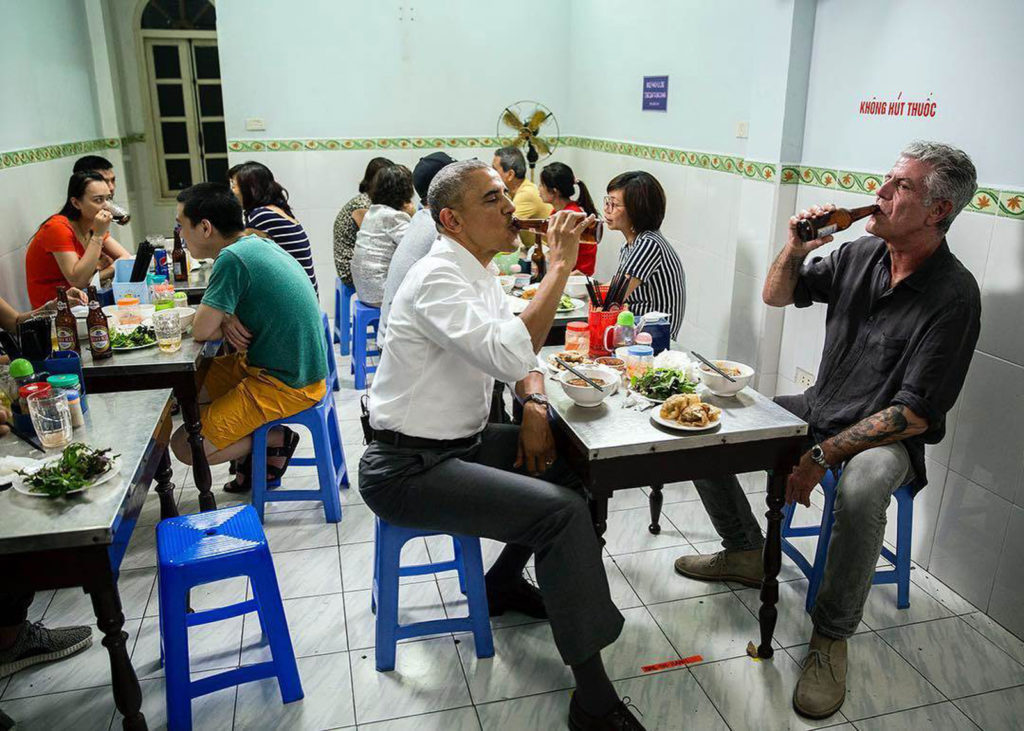
Obama and Bourdain enjoy a beer in Vietnam. Photography by White House photographer Pete Souza. Source: Flickr/Creative Commons.
While I’ve been away my life has stopped resembling most of my friends’ in any way. I look back and see people I’ve known forever as they’ve marked off all the traditional milestones of adulthood; getting married, having children, making homes. This was not the path for me, it turned out. The road forked and I went the other way.
It has at times been filled with crushing despair and loneliness so deep, where the saddest place I’ve ever been is a motel on the side of some desolate highway, with drip coffee that’s been sitting in the pot for hours. But I have met people and done things and seen places I could never have dreamed of as a child in a home so miserable I thought I would never escape. I’ve hiked across a glacier with an astronaut and swam in the black sea above the Arctic Circle. I’ve been swimming in other much warmer oceans while dozens of dolphins swam beside me and a whale crashed its tail onto the water. I’ve walked hours to isolated waterfalls, accepted rides on the back of motorcycles from men I only just met. I’ve camped out in my car with the boot open onto the Grand Canyon. I’ve been invited into the homes of people I barely knew, whose language I could barely speak. Other times I’ve met fellow travellers and talked into evenings that became dawn where I told stories I’ve never told anyone. I’ve met people who will be in my life now until the day that I die.
Lately I’ve been thinking that I have to decide sometime soon where my home really is. In dark moments I wonder if it wasn’t all one long terrible decision. Then I try to remember that it is only one life that we get on this earth, that it will one day be dead, absorbed by the sun, and that none of us will be coming back. And I remember the miniscule unlikelihood of even being here in the first place, to be alive, and it was all worth it.
All of it was worth it.
Bourdain made the world feel possible to people who were too poor or too broke or too tied to low paying jobs they can never take leave from, just trying to make ends meet. He made it feel possible to take profound, lusty, libidinous joy in the smallest things, like a three-dollar bowl of soup. I try to think of the best way to honour his life, and I think that would be for everyone to adopt his outlook in the small day-to-day of our own lives. Teach yourself a new recipe. Venture to a part of town you’ve never been to. Eat something you’ve never tried before. Strike up a conversation with a stranger. Call someone you haven’t for a long time and tell them that you’re thinking about them. Invite someone over for a meal and cook for them. Let them know they can tell you anything.
There’s one scene from Parts Unknown that perfectly sums up Bourdain for me. He is sitting on a beach in Brazil, where he describes his perfect day as doing just that, eating fresh seafood and drinking cold beer. He is telling us this while sucking the sweet flesh out of a crab claw, which inspires a short, impassioned rant about his disdain for people who won’t do anything difficult, who “aren’t willing to work” for even a great reward like a fresh cooked crab. Not even something as simple as cracking open crab shells for themselves. That people refusing to deal with the claw shell by cracking it open with their teeth, were “the beginning of the erosion of our society as we know it.”
He’s joking, but not really. He’s angry at the thought of what we might miss out on if we are intimidated or afraid of what is unfamiliar and let it get the best of us. He is baffled and also verging on despair. Then he looks out over the ocean as the sun sets in the distance, we hear in his voiceover:
“And if your perfect day really did happen, you’d probably let yourself be swept away.”
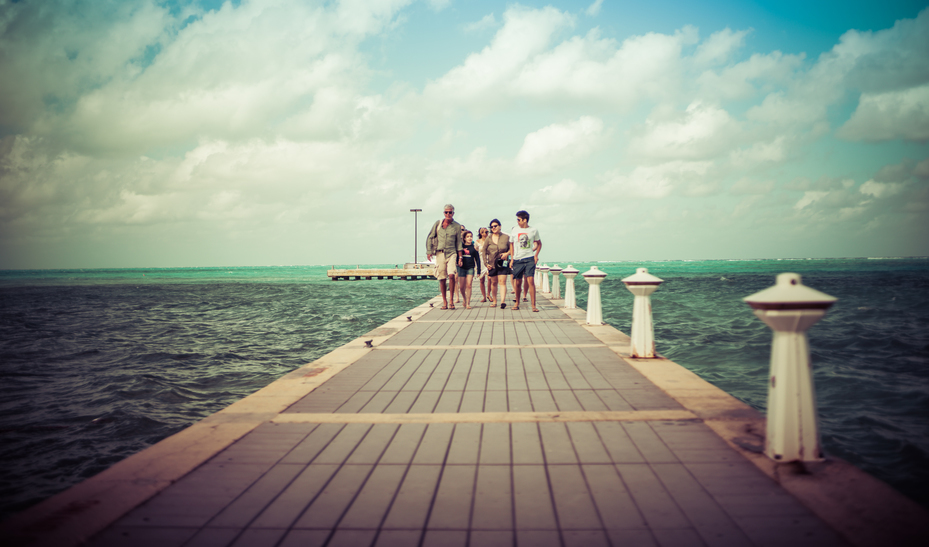
Anthony Bourdain holds the hand of his 9-year-old daughter as they walk off the yacht and onto Rum Point, Grand Cayman. Photo and caption credit: Trey Ratcliff.
If you or anyone you know are experiencing mental health issues or suicidal feelings contact Lifeline
on 13 11 14 or BeyondBlue 1300 224 636. If it is an emergency please call 000.


